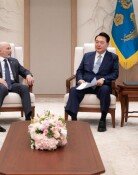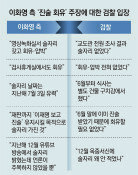S. Korea, U.S. likely to agree on atomic energy pact this year
S. Korea, U.S. likely to agree on atomic energy pact this year
Posted October. 25, 2014 03:54,
South Korea and the United States welcomed "significant progress" in negotiations for a bilateral atomic power pact and reaffirmed that they will seek to reach an agreement at a right time. The decision was made at a high-level security and alliance talks among their top diplomats and defense chiefs at the U.S. Department of State building in Washington on Friday.
The announcement suggests that the 4-year-long bilateral atomic power talks will likely be concluded within this year. The two sides made a breakthrough in the talks after Washington accepted Seoul`s request for allowing limited reprocessing of spent nuclear fuel.
South Korean Foreign Minister Yun Byung-se and Defense Minister Han Min-koo attended the meeting with their U.S. counterparts, Secretary of State John Kerry and Secretary of Defense Chuck Hagel. The leaders had in-depth discussions about international issues including the North Korean nuclear threats and the Ebola outbreak. The top diplomats from the two allies met separately after the meeting.
Seoul and Washington also agreed to expand their comprehensive strategic alliance in connection with Thursday`s agreement to postpone the transfer of Washington`s wartime operational control (OPCON) of South Korean forces from December 2015 to 2023. They also agreed to upgrade their alliance to a global partnership for fighting the Ebola outbreak and the jihadist group Islamic State.
Earlier on Thursday, the South Korean foreign minister paid a courtesy visit to U.S. National Security Adviser Susan Rice. Minister Yun explained to her the South Korean government`s position that it will deal sternly with North Korea`s provocations but will continue to make efforts to make peace on the Korean Peninsula.
Meanwhile, the South Korean presidential office Cheong Wa Dae stressed that the OPCON transfer issue should be seen "with a cool head from a realistic perspective of national security."







